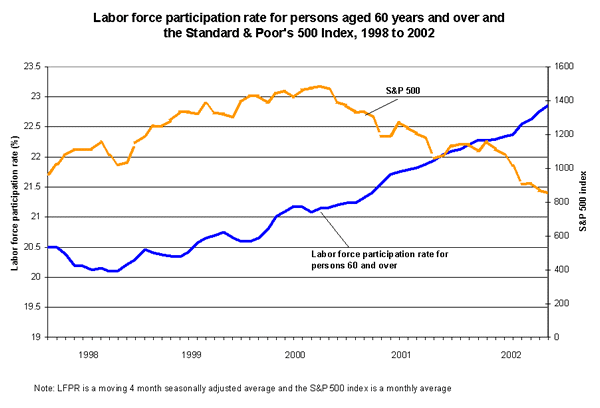Snapshot for December 4, 2002.
Are health costs postponing retirement?
Running counter to the national trend of a deteriorating employment picture-characterized by falling labor force participation rates, private sector employment losses and rising unemployment-the employment and labor force participation rates (LFPR) of workers aged 60 and older have increased in recent years. Some observers suggest that the stock market decline since January 2000 caused large numbers of older workers to postpone retirement, or return to work from retirement, because their 401(k) plans and other investments have lost so much value. This scenario might have occurred, but cannot fully explain the trend toward increased labor force participation by seniors, a trend that began in August 1998 when the Dow was still rising meteorically.

The figure above illustrates the rise in the LFPR of workers aged 60 and over, between August 1998 and October 2002, from 20.1% to 22.9%. (These figures are four-month moving averages.) That is a 13.9% increase, representing 1.7 million additional seniors in the labor force. In contrast, the LFPR for prime-age workers, aged 25-54, fell by 1% over the same period. When the S&P 500 stock market index began its decline in August 2000, the LFPR for workers 60 and over had already risen by 5.2%.
The reasons for this counter-trend are not certain, but because it preceded the stock market crash, it is unlikely that bad portfolio performance is primarily responsible for older workers’ staying in or returning to the workforce. One possible explanation is the declining health insurance coverage for retirees. In recent years, increasing numbers of employers have imposed caps on retirees’ health premiums, increased co-payments, imposed longer service requirements to qualify for retiree coverage and generally shifted the health care burden from themselves to their retired employees. It seems likely that one response of employees has been to delay retirement or return to the workforce.
This week’s Snapshot by EPI vice-president Ross Eisenbrey and Matthew Walters.
Check out the archive for past Economic Snapshots.
Preferred Citation: Economic Policy Institute, “Economic Snapshots, [insert date].” Washington, D.C.: Economic Policy Institute, 2002.
